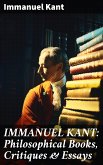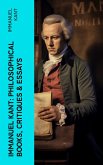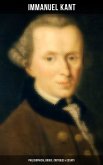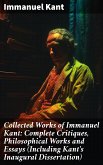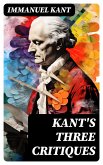Immanuel Kant's 'Philosophical Books, Critiques & Essays' is a compendium that embodies the Enlightenment's rigour in pursuit of human reason and understanding. Within its expansive coverage, it includes foundational texts such as the 'Critique of Pure Reason,' 'Critique of Practical Reason,' and 'Critique of Judgment'-works that reassess the very bedrock of philosophical inquiry, ethics, and aesthetics. Their dense and often architectonic style, while challenging, remains paramount in the literary canon of Western philosophy. This edition, digitally optimized for contemporary devices, ushers Kant's groundbreaking insights into the 21st century, ensuring fluid accessibility without compromising the integrity of the original German prose and its complex argumentative structures. As a titan of philosophical thought, Immanuel Kant has greatly influenced various fields-epistemology, ethics, metaphysics, and aesthetics-cementing his place as a pivotal figure in modern philosophy. His unique approach, sometimes referred to as Kantianism, revolutionized the way subsequent thinkers approached the human condition, morality, and the mind's role in shaping our experiences. This publication's careful assembly of Kant's works alongside an instructive introduction by Robert Adamson and critical commentary by Arthur Schopenhauer offers readers a broad and critical perspective on Kant's oeuvre. It reflects the culmination of Kant's lifelong dedication to understanding the limits of human knowledge and the universal principles governing ethical actions. This scholarly edition is a must-have for students and aficionados of philosophy. It not only serves as an indispensable resource for those seeking comprehensive insight into Kant's intellectual legacy but also provides a platform for engaging with the challenges posed by his critiques. Meticulously formatted and presented, this collection invites contemplation and debate among philosophers, historians of philosophy, and anyone intrigued by the monumental questions that resonate through Kant's writings. 'Immanuel Kant: Philosophical Books, Critiques & Essays' remains an essential contribution to any serious philosophical library, illuminating the profound inquiries that define the human quest for knowledge and moral reason.
Dieser Download kann aus rechtlichen Gründen nur mit Rechnungsadresse in A, B, BG, CY, CZ, D, DK, EW, E, FIN, F, GR, H, IRL, I, LT, L, LR, M, NL, PL, P, R, S, SLO, SK ausgeliefert werden.



